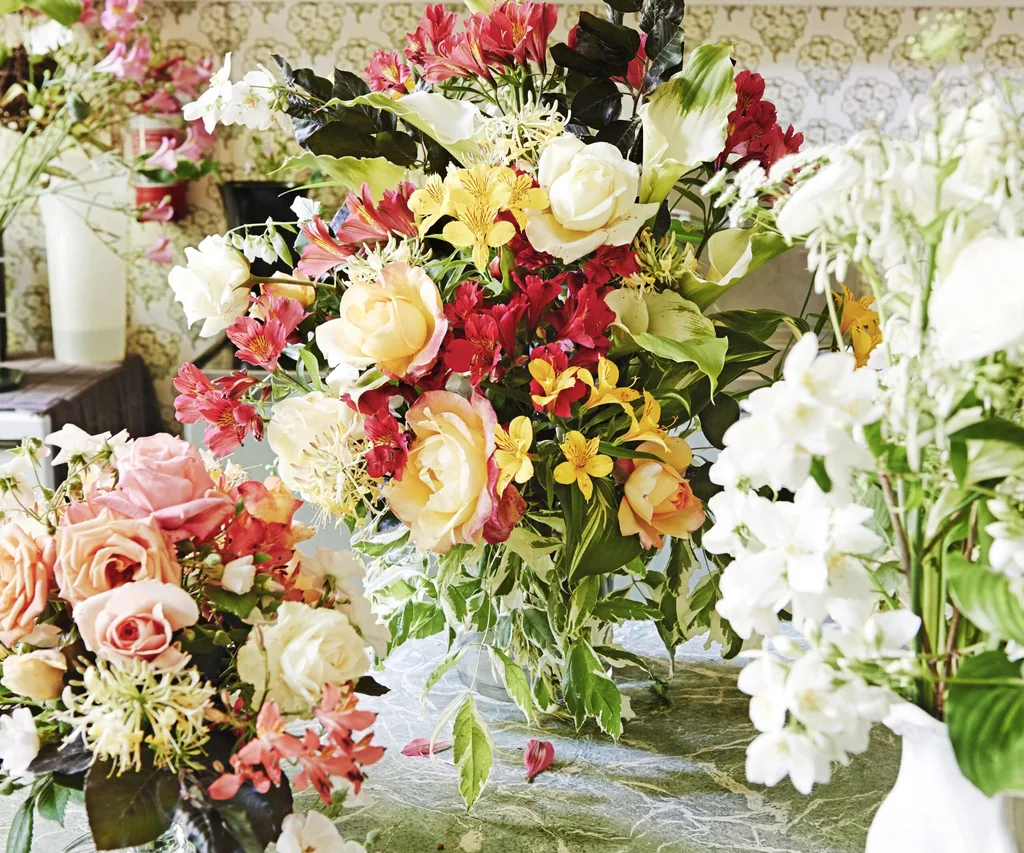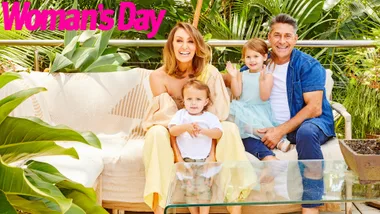On the outskirts of Melbourne, beyond a modest wooden sign saying “Cruden Farm”, 130 lemon-scented eucalypts stand sentry along a narrow drive leading to a two-storey neoclassical farmhouse with soaring pillars.
Generations of the Murdoch family have grown up on this Langwarrin property, milking cows and herding sheep amid the majestic oaks and elms, walled gardens and a lake complete with charming stone bridge.
Just a short walk from the kitchen door is the picking garden – a technicoloured riot of roses, lavender, catmint, poppies, honeysuckle and zinnias.
Every morning, the irrepressible Dame Elisabeth Murdoch would be up before sunrise, watering her beloved garden and picking flowers, either for the arrangements scattered throughout her home or for the friends she was seeing that day.
“When Granny came to Melbourne, she’d always bring posies,” recalls Penny Fowler, grand-daughter of the much-loved philanthropist, who died in 2012 aged 103.
“Arranging flowers has always been a part of Cruden Farm – you’d come down here and there were beautiful flowers everywhere. It was a big part of Granny’s life.”

Dame Elisabeth Murdoch used to get around the farm in a golf buggy.
According to grand-daughter Judy Paterson, Dame Elisabeth was still scaling Cruden Farm’s elm trees to pick branches for her arrangements when she was well into her 80s.
And even after she had turned 100, the matriarch continued to whiz around the 54-hectare property in her golf buggy (an 80th birthday present from son Rupert), making plans with her long-time gardener, Michael Morrison.
A wedding gift in 1928 from her husband, newspaperman Keith Murdoch, Cruden Farm was a lifelong passion for Dame Elisabeth.
A natural, hands-on gardener with an eye for beauty, the mother of four presided over the property for more than eight decades, creating a garden that would become one of the most celebrated in the country.

(Clockwise from top left) The 54-hectare Cruden Farm is awash with colour; Dame Elisabeth’s grand-daughter Penny and daughter Janet with gardener Michael Morrison; Landscape designer Paul Bangay; and, the stunning Brilliance rose.
Today, three of Dame Elisabeth’s grand-daughters – Penny, Judy and Julie Kantor – and her daughter, Janet Calvert-Jones, gather in the garden with world-renowned landscape designer Paul Bangay to mark the upcoming campaign for the Murdoch Childrens Research Institute (MCRI), which Dame Elisabeth helped establish 30 years ago.
“She cared very much about looking after kids when they were sick,” explains Janet, “but she thought that if people could find causes and prevent illness, then that would be even better.”
In honour of Dame Elisabeth, the MCRI is inviting Australian women to host a garden party to raise money for the institute and is releasing the Brilliance rose for sale in July, with part of the proceeds going to the research organisation.
MCRI ambassador Paul Bangay describes the Brilliance as a full, bushy hybrid tea rose that looks good in the garden bed.
“It’s a lovely white flower and it’s a good one for picking,” he says.
“It’ll flower the whole season, starting in early spring and finishing in autumn.”
Dahlias, irises and sweet peas last quite well inside the house, he says, but roses are the standouts for hardiness, particularly hybrid teas, which have been bred for picking.
Old-fashioned varieties, such as David Austin roses, look and smell beautiful in the garden, says Paul, but collapse as soon as they are cut – as do the helleborus, anemones and some types of hydrangea.
The hydrangea macrophylla, however, will last inside for weeks.
“With hydrangeas, you want them out in full flower [when you cut them] because otherwise they won’t come out in flower in the vase,” he says.
“With roses, you can pick them just as the bud is starting to swell.”
A landscape designer for 30 years, Paul laments that people have given up on gardening and that the knowledge once handed down the generations has been lost.
“People are outsourcing their gardens, which I think is sad,” he says.
“I think growing flowers and bringing them inside encourages people to select their own plants, become passionate about their garden and not think of it as something you just get a gardener to come in and do.”
Paul, who met Dame Elisabeth in 1982 as a horticulture student and became friends with her over the next 30 years, says one of the things he admired most was her 80-year commitment to one garden.
“She was never afraid to pull something out,” he says, “or experiment with new things.”

When she picked flowers for her home, each room called for a specific colour palette: flowers of a pink or brown hue in the sitting room; and apricot-coloured roses in the entryway.
Known for her frugality, Dame Elisabeth refused to install central heating at Cruden Farm and would never have bought a bouquet either.
“It just wouldn’t have been in her psyche to go buy flowers,” says Paul.
“The fact that you can grow your own flowers was very important to her.”
Gardener Michael Morrison, Dame Elisabeth’s right-hand man at Cruden Farm since 1971, adds, “She was always anxious, being practical, that flowers lasted, so she always loved to put a lot of budding flowers in her arrangements.”
Over 40 years together, Michael and “the boss” arranged flowers for the weddings, funerals and parties of countless Murdoch friends and relatives.
“She enjoyed the flowers in her garden,” says Michael, “but it gave her enormous pleasure to share them with someone else.”
It is more than three years since Dame Elisabeth died, and yet Michael still makes sure there are always fresh flowers in every room of Cruden Farm.
What a fitting tribute to the extraordinary woman who lived there.









.jpg?resize=380%2C285)

